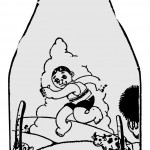March 2021
Vivian Mannheimer and Marina Lemle | Blog de HCS-Manguinhos
In the Editor’s note of the latest issue of HCS-Manguinhos, scientific editor Marcos Cueto announces a new set of guidelines for those wishing to publish in the journal.
The new instructions seek to respond to the open science movement, which involves much more than just open access to documents. In the letter, Marcos Cueto also highlights what makes a good article in the field of History:
“The goal is to create a piece of writing that is relatively short but clear, orderly and deep in its approach to and interpretation of the problem (generally one or two per article); it should explain the methodology used, avoid repetition in presenting evidence, and establish a dialogue with other researchers,” says the letter.

The new new guidelines are are now clearer and more up to date, seeking to respond to the open science movement.
In this interview to our blog, Marcos Cueto explains what are the main changes in authors guidelines and how they are related to the open science movement.
1- What elements does a good article in human sciences, especially History (which is considered part of the human sciences in Brazil), should have?
One of the criteria for evaluating a young researcher in the field of History – in addition to the quality of his doctoral thesis and intellectual honesty – is his publications in prestigious journals. Unfortunately, workshops or classes for elaboration, writing and publishing of scientific articles are very rare in doctoral programs in the humanities. Most teachers mistakenly assume that the ability to write clearly, profoundly and in an orderly manner is learned spontaneously or by osmosis by students.
In addition to plagiarism and self-plagiarism, which fortunately are now uncommon, as most journals have programs to identify these problems, many authors do not invest enough time in the elaboration of their texts. The preparation of an article requires: the identification of an internationally well-
A second mistake is to believe that a chapter of a thesis is automatically an article. It is not. A chapter forms part of an integrated structure, contains multiple references and citations, and is part of the construction of several arguments or hypotheses, and, generally, does not have word limits. An article is, to some extent, “self-sufficient”. An article needs to justify the importance of the theme, demonstrate mastery of the existing literature, economically manage the exposure of facts and develop an interpretation that is a contribution to knowledge. Extracting a chapter from a thesis without changes to send it to a journal usually leads to a mutilated text, which will be rejected. This statement does not mean that sections of a thesis can’t become the basis for an excellent article after being thoughtfully reformulated.
2- What are the main changes in the instructions to authors and why were they implemented?
The changes in the instructions to authors were made mainly due to four reasons: to give more clarity to the authors in relation to our rules; the need for changes in word limits in the texts submitted to some sections; the search for a better adaptation of the texts to the format of the journal, and our voluntary option to participate in open science.
Our “Analysis” section, that publishes most of the journal’s articles, went from a limit of 10,000 words to one of 9,000 words. The “Historiographical Review” section, which includes articles addressing topics of interest to the journal, can now be submitted with a total of 10,000 words (before there were 12,000).
These changes were necessary due to the large number of articles submitted and approved in our journal in recent years. In addition, we want to promote more cohesive texts that present absolutely necessary ideas, notes and quotes – similar to those published in international journals.
In addition, the journal now focuses on three major themes: the history of science and health; analysis of science communication and studies of historical-cultural heritage linked to science and health.
Another important change is that the norms of the review section (previously called books and networks) are now clearer. The contributions should present a critical panorama of works published in the last two years, relating the main argument of the book to contemporary debates and examining the methodology and sources. One aspect to be highlighted is that authors and reviewers cannot be advisors and advisees.
Finally, I would like to point out that all proposals for special issues and dossiers must now be sent, following author’s guidelines, directly to the scientific editor – who will carry out an evaluation with other editors in the shortest possible time. On this matter, it is also important to say that we have decided to publish only one dossier and one special issue per year in our journal.
3 – How do the new instructions to authors seek to adapt the human sciences to open science? What are the main differences in relation to exact sciences and life sciences?
Open science is more than giving open access to articles, which is already a practice used by almost all Brazilian periodicals. Open science is the best way to speed up the dissemination of research results and provide transparency to the evaluation process. There are some open science adaptations to history texts in our instructions because there are differences between these articles and those in the exact or life sciences. For scientists in these fields of knowledge, it is important to give immediate access to their ideas, methodologies and experiments and most of their citations are from very recent articles.
For us, researchers in the humanities, an article over fifty years old may be relevant. However, we think it is important to reduce the waiting time between approval and publication of articles and to accept to evaluate works published in prestigious academic repositories called preprint, such as SciELO.
These preprints receive comments and a precious DOI (Digital Object Identifier), which identifies the article in any library in the world – this DOI is different from the one received when the article is approved by a journal.
Another important aspect of open science is the possibility to register materials from the research process, which may be useful to other researchers. For historians these materials are: a description of the archival collections used (which can be furnished in a paragraph or a reference in the articles); statistical tables and images that could not be used in the final version of the work; transcriptions of manuscript and print sources and of oral interviews that have been excerpted and cited; and the reports made to the funding agencies that indicate how the research evolved before arriving at final publication. These materials should be sent to an institutional repository, such as those that universities have in their libraries, and it should be somehow mentioned in the published article.
However, this will not be mandatory, for now, to send these materials for the acceptance or refusal of an article in História Ciência Saúde Manguinhos. We believe that an an after-the-fact overview by the authors of the whole process of their research is essential to enrich the knowledge base of the human sciences.
Another adaptation to open science principles in our journal is that we will ask reviewers and authors whether they wish to reveal their identity voluntarily in the review process and/or whether they wish their reviews to be published under their names. This is different from the traditional “double blind” system, characterized by anonymity between authors and reviewers. The rationale for open assessments is that it encourages true interaction between authors and reviewers. This interaction benefits the readers, because they reveal how the ideas of a research have evolved; oblige the evaluator to send consistent, constructive comments; the evaluators would have fair academic recognition for their work; it would avoid harsh assessments that sometimes appear in anonymous evaluations; it could also serve as a model for young researchers who don’t know how to evaluate an article.
Approval or rejection of an article does not depend on the author’s willingness to reveal his or her identity to the reviewer. We believe that authors who accept and promote open science will enjoy greater visibility and citation of their articles.
Adapting open science to a humanities journal cannot be imposed immediately and there must be a dialogue, a consensus. For now, authors can hide their name and institutional links in the process of reviewing articles and evaluator remain anonymous. We believe that authors and reviewers will begin to realize the importance of these adaptations of open science. For now we will publish only a limited amount of open reviews, always with the prior acceptance of the evaluators.
4 – HCS-Manguinhos is launching a new section entitled “Covid-19 testimonies”. What are the recommendations for authors who wish to submit articles to this section?
The new section collects improved versions of the texts we published in our blog, in the section “History and Coronavirus.” I believe that for some time historians will be called to make sense of the pandemic that we now experience. COVID-19 strengthened the links that intertwine biological and scientific events with political, economic, social and cultural ones.
Main reflections made by historians about the coronavirus pandemic at the moment could be primary sources for future generations of researchers. Historians can show the origin of scientific negationism and the necropolitics of authoritarian governments that hide themselves in irresponsibility and indifference. This section also intends to be part of the movement that exist in different countries showing the critical voice of historians at a time when viruses and vaccines have nationalities and even ideologies.
How to cite this interview: Cueto, M. The future of the scientific article in the human sciences. In: Revista História, Ciências, Saúde – Manguinhos (Blog). Published in March, 2021. Accessed in [date].
See:
Cueto, Marcos. New instructions to authors and the future of the scientific article in the human sciences.Hist. cienc. saude-Manguinhos, Mar 2021, vol.28, no.1, p.7-9. ISSN 0104-5970








